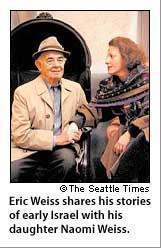 Fifty years ago, against world opinion and against all odds, Jews willed a homeland into being. Fifty years ago, against world opinion and against all odds, Jews willed a homeland into being.
On a sticky May afternoon in Tel Aviv in 1948, Prime Minister David Ben Gurion read
a declaration of independence announcing that what once was Palestine now was Israel.
With that simple ceremony, Jews had a land of their own for the first time in 2,000 years.
Ben Gurion offered peace to the surrounding Arab nations that day but might as well have invited war. Egyptian, Syrian and Lebanese forces crossed into Israel that night.
Israel celebrates its 50th anniversary
this year almost as challenged as it was in 1948. Relations with the rest of the Middle East are shaky at best, and hope for peace with the Palestinians is all but dead. The economy is dragging, and there's an increasingly testy religious dispute over who is Jewish enough
to be an Israeli.
But if Israelis are finding it difficult to stay in good spirits, the anniversary is cause for Jews in the rest of the world to celebrate.
They feel a connection to Israel that goes beyond ethnicity, beyond religion. There's enormous pride that a people who survived a 2,000-year Diaspora and the ovens of the Holocaust could summon the strength to regroup, to build and defend a Jewish homeland in the land of their biblical ancestors.
This special report looks at Israel's history, its people and some of the challenges it
faces, through the eyes of one family whose generations today live in Seattle and Portland, outside ancient Jerusalem and in modern
Tel Aviv. Their story is not unusual or
heroic. Many of the 5.9 million Jews in the United States, and the 40,000 in Washington state, could find in their families stories as compelling.
Which is partly the point: As Jews say today, the story of Israel is the story of all of them.
|





